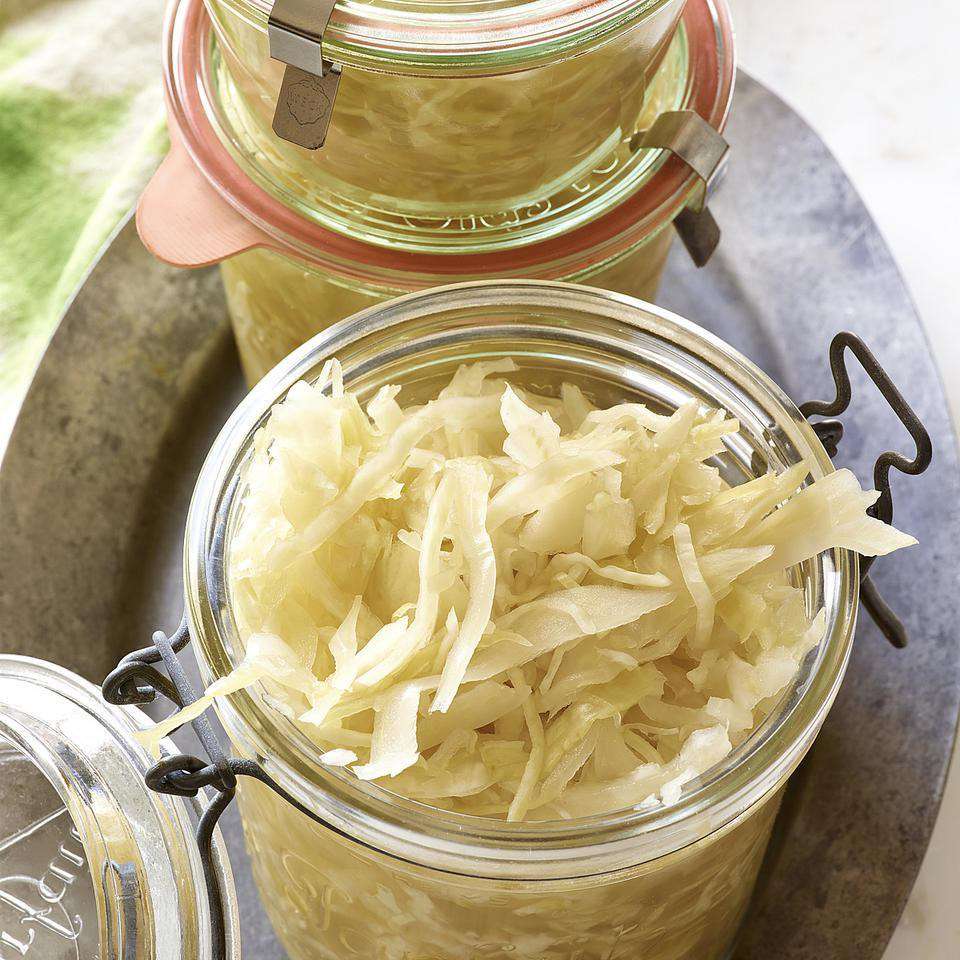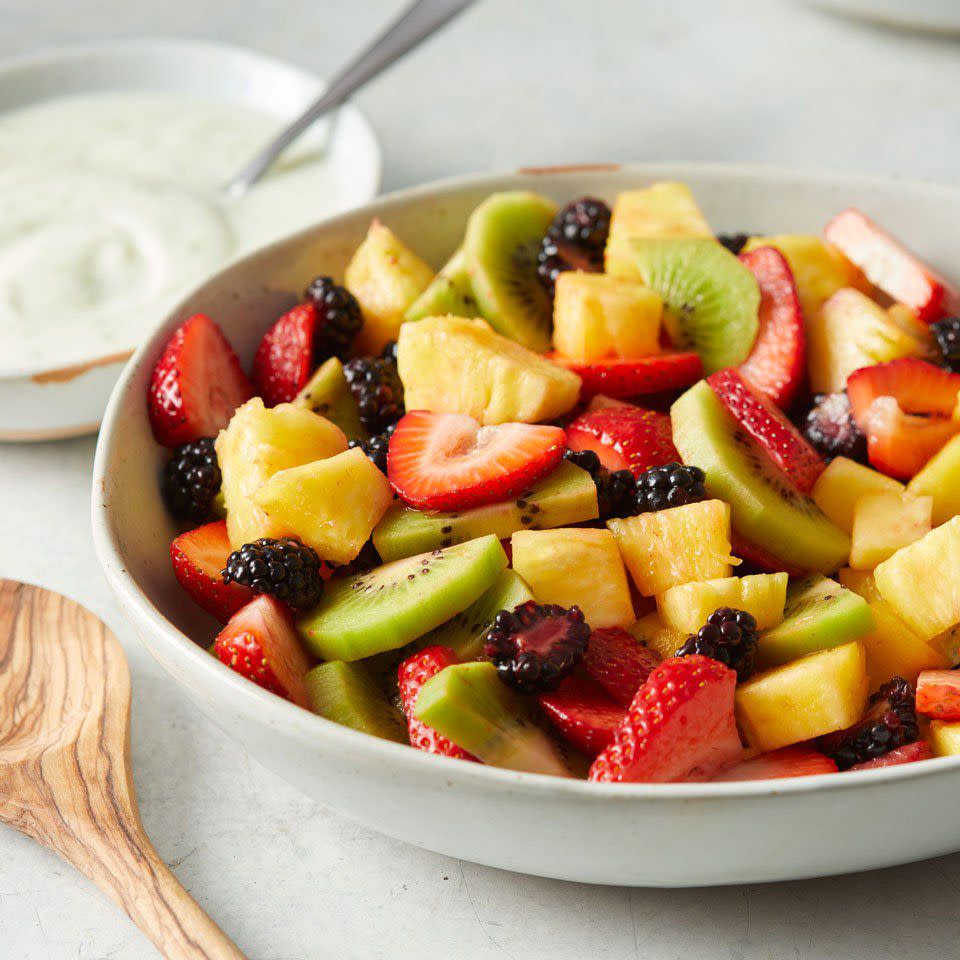Are You Eating for a Healthy Gut?

https://static.onecms.io/wp-content/uploads/sites/44/2018/12/27113323/37585981.jpg
Pictured recipe: Simple Sauerkraut
Trillions of bacteria reside in your large intestine. These little bugs are known as your gut microbiome.
Scientists used to think these bacteria just hung out there, with no particular role. Now, however, they're learning that the types of bacteria in your gut are directly related to health conditions, such as obesity, cardiovascular disease and colon cancer.
Each person's gut microbiome is unique. The makeup is determined partly by your mother's microbiome and initial exposures after birth, as well as by your diet and lifestyle. To make sure your microbiome is healthy, you'll need to eat gut-healthy foods and sometimes supplements. These help your good microbiome flourish.
Take the quiz below to help you see if you have a healthy gut. If not, don't worry! We have tips to help you turn your gut health around in no time.

Pictured recipe: Clean Breeze Smoothie
1. How many servings of fruits and vegetables do you eat per day (1 cup = 1 serving)?
<1
1-2
3-4
5+
2. How often do you consume fermented foods and beverages (e.g., kimchi, kombucha, yogurt, tempeh, miso, sauerkraut)?
Never
Monthly
Weekly
Daily
3. How much water do you drink per day?
1-2 cups
3-4 cups
5-6 cups
8+ cups
4. How many servings of red meat or processed meats do you eat each week (1 serving = 3 ounces or the size of a deck of cards)?
6+
4-5
2-3
1 or less
5. How many servings of processed foods (anything packaged) do you have per week?
6+
4-5
2-3
1 or less
Add up how many A's, B's, C's and D's you have. Then read the descriptions below to determine the health of your gut.
Eating more fiber-rich fruits and vegetables and fermented foods and staying hydrated all help keep your gut bacteria happy. Red and processed meats and packaged processed foods have been linked with poor gut health.
Mostly 1's - Time to reboot your gut

Pictured recipe: Fresh Fruit Salad
Don't worry. It's never too late to start making changes towards a healthier gut. It doesn't have to be time-consuming either.
Start by swapping one beverage a day for a fermented drink, and pair it with a salad for lunch.
Ditch the processed snacks and reach for a fruit or vegetable instead and you'll be well on your way to a healthier gut.
Try These: 7 Must-Eat Fermented Foods for a Healthy Gut
Mostly 2's - Not terrible but could be better

Pictured recipe: Grilled Tempeh Salad with Sesame-Ginger Dressing
Things could be worse, but they could also be better. Focus on the three F words: fiber and fermented foods. Aim to make half your plate vegetables at lunch and dinner. Loading up on fiber delivers prebiotics-no, not probiotics. Prebiotics is a fancy term for the type of fiber that's not digested but rather moves into the large intestine and becomes food for the healthy bacteria that are already there. When the good bacteria feed on it, they produce more good bacteria, as well as butyrate, a short-chain fatty acid that protects against colon cancer.
Read More: Gut Health: Prebiotics, Probiotics and the "Forgotten Organ"
Mostly 3's - You're almost there

Pictured recipe: Easy Brown Rice Pilaf with Spring Vegetables
You're on your way to a super-healthy gut. Keep up the fiber and hydration, but consider adding more fermented foods to your diet. Fermented foods provide probiotics, which add more good bacteria to your gut. Natural sources of probiotics include yogurt (get the plain for less sugar), kimchi, tempeh and kombucha.
Read More: 6 High-Fiber Food Swaps to Make Right Now
Mostly 4's - Super-healthy gut

Pictured recipe: Bean Salad with Charred Lemons
Congratulations! You love your gut, and your gut loves you back. Those bacteria love noshing on fruits and vegetables. The more roughage, the better. Fiber is the food of choice for the bacteria in your intestines. When the good bacteria feed on fiber, they produce more good bacteria. You're also adding more good bacteria through probiotics and fermented foods. Keep drinking water throughout the day to stay hydrated.
Try These: Healthy Vegetable Side Dish Recipes
Watch: How to Make Kimchi
How to Make Kimchi
Kimchi is high in fiber and, since it's fermented, loaded with good gut bacteria!
<a href="https://www.eatingwell.com/article/288067/3-surprising-reasons-your-gut-health-matters/">3 Surprising Reasons Your Gut Health Matters</a>
<a href="https://www.eatingwell.com/article/283417/how-good-gut-bacteria-could-transform-your-health/">How Good Gut Bacteria Could Transform Your Health</a>
<a href="https://www.eatingwell.com/article/290445/3-foods-to-ditch-for-a-healthy-gut/">3 Foods to Ditch for a Healthy Gut</a>
